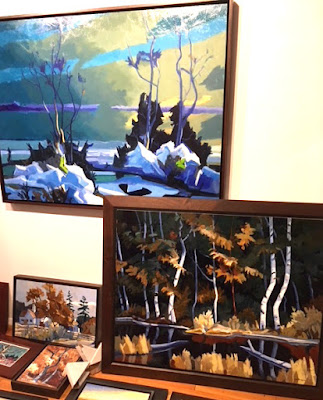Part Two: Magician-Builder

Philip Koch, The Birches of Maine, oil on
canvas, 40 x 32", 2008
Making a painting is a double-edged sword. On the one hand you have to dive deep into that hidden part of yourself where your feelings lie. On the other, you have to pull yourself out of yourself and instead inhabit your materials and your tools.
The first part is the hardest I'm convinced. Visual art isn't primarily about ideas. Of course when art is powerful it stimulates us to think of all kinds of things, often all at once. But at its heart it is about visions. Personally I think the closest equivalent we have all experienced are the vivid dreams we have when we're alseep. Their action unfolds usually in a series of wordless images often accompanied by strong emotions. We are usually the stars.
A painting isn't literally a dream, but when it's powerfully painted, its spaces and shadows evoke the feeling that you are entering another realm. Even when it's an extremely rendered realist painting, there is still a sense that it exists in a special universe of its own. The artist has to come up with hundreds of new combinations of shapes and colors to make even the simplest painting. The right choices make their envisioned worlds palpable and irrefutable.
Artists call this inventing. Always there are passages that have to be pulled out of the thin air and made to fit the evolving painting. In my painting above I started out with the urge to paint a dense forest but one where there was an exuberant liveliness. Most of all I wanted the birches in the foreground to dominate. Scratching around for ways to simplify the arboreal multitude, I hit on the solution of darkening the sky and background trees way down. It worked.
There is always a "something out of nothing" surprise when you finally find the missing color or movement the painting has been needing. I like the word magician because I think it captures some of what's so remarkable in this fleshing out of the artist's vision so it carries real authority.
None of this proceeds like Merlin tapping his magic wand and commanding something to appear. Rather we have to work with our materials and our tools.
"Magic Wand?"
The most beautifully developed vision remains just a pipe dream unless the artist can get it out onto the canvas.
Like masons, we spend an inordinate amount of time with trowels in our hands. There is a cosmic rule that the pigment never comes out of the tube just the way you need it. Instead you spend by far the majority of your time mixing specific colors. I have spent literallly years of my life with a palatte knife swirling around and mixing to get just the right hue. In a way it is a meditation.
Something amazing gradually happens. Over time, you find your conscious mind seems to step back and your eye and your hand take over making the pigment choices. The same is true with your choice of brushes, grounds, medium, and so on. You build connections with your materials and tools that are so deeply rooted in your experience even you don't understand them.
I like the image of a stone mason building a wall. If you've seen good ones at work, it seems like they do it by feel alone. There's an elaborate dance between the mason, the mortar and the stone. The craft of it and the craft of painting are close. You get to a point where you're guided as much by instinct as much as by your knowledge.
I said before the artist has to be a magician, and now I'm saying we have to have a deep mastery of our craft. We are after all master builders of artworks that showcase our vision. I'm thinking of getting a business card printed listing my profession as Practical Magician.



